
Day: September 15, 2021

Proof of Origin NFT Auction Details
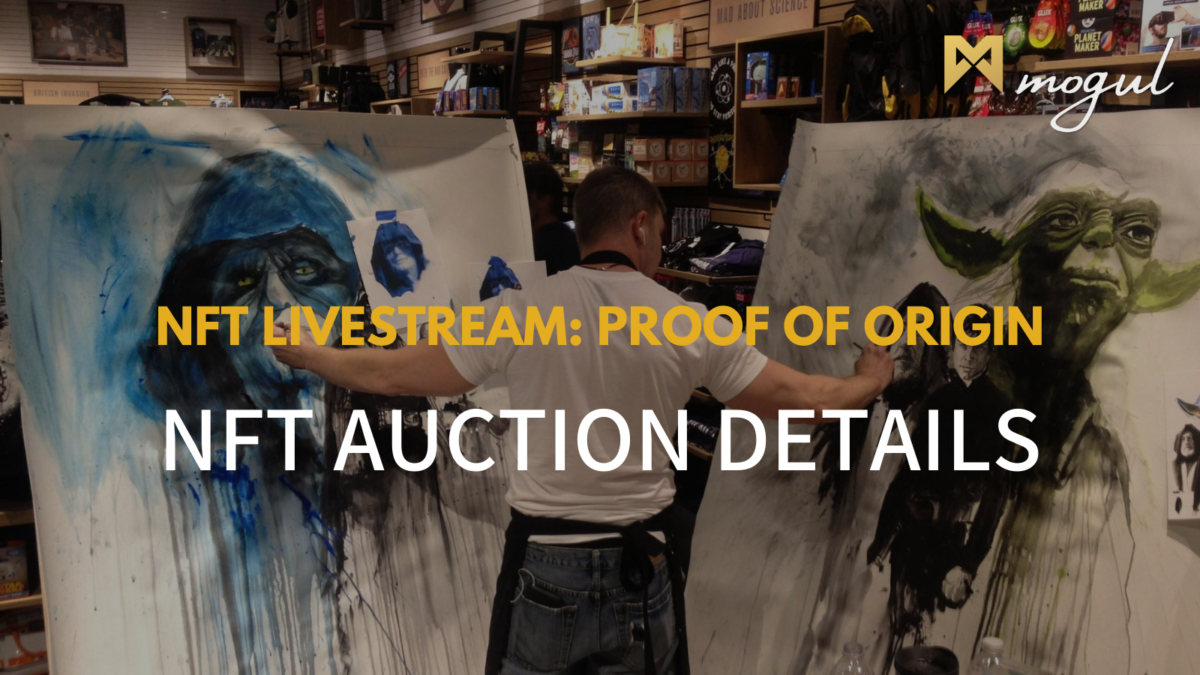
Important Details
- The auction will start on the 27th of May at 8pm EDT
- The auction is conducted only with STARS tokens
- Starting price is 100,000 STARS tokens
- If your bid is beaten or unsuccessful you will receive the bid amount back to the wallet it was sent from, minus the gas fee
The NFT
Rob Prior’s Wolf of Wall Street NFT is titled “Reign of Money…. what the f$ck”. The NFT is an ERC1155 token built on the Ethereum blockchain. The token can be viewed on OpenSea here.
Paintings are difficult to make into NFTs. An artist can digitize a painting, but it’s nearly impossible to prove that the NFT will be the only instance of that painting. There’s always the question – “but what about the original?”
For the first time in history, Rob Prior and Mogul Productions will be converting a one-of-a-kind painting into a provably verifiable NFT, where it will only live as an ERC1155 token.
Inside the metadata of the token, the purchaser will be able to access the following items:
1. A full rendering of the painting
2. A video of Rob painting the original painting
3. The animated version of the painting
So, the purchaser will be able to see the creation of the painting within the token itself! Plus, all viewers at the Proof of Origin event will see Rob burn the original painting live on camera.
The Basics
Mogul is excited to be holding an auction for an NFT based on an original painting depicting the Wolf of Wall Street. Produced by the talented artist Rob Prior (of Marvel & DC Comics), the entire process will be livestreamed on your Mogul Dashboard after logging in. If you are unable to access Mogul for whatever reason, you can watch the full livestream on YouTube here: https://youtu.be/C-4Efre015Y.
Once the painting has been completed and the work memorialized in NFT format, the original work will be burned to ensure the NFT is the only remaining version of this piece!
The auction will take place on the Mogul Productions Dashboard shortly after the Rob Prior Proof of Origin event concludes (5pm EDT – 8pm EDT). You will need to be logged into your account, and you will need a MetaMask wallet containing enough STARS to cover your bid, and enough ETH to cover the required gas fees.
You can purchase the STARS token on our website here. Or alternatively you can go ahead and use a service like Uniswap. You will likely get a better price with the second option, as STARS are sold at a fixed price on Mogul. Here’s a guide on Uniswap and how to use it.
Please be aware that due to the length of time it can take for transactions to be processed on the ETH network, any bids submitted shortly before the cutoff time may not be received in time. In this case, your funds will be returned to you minus the gas fee. To avoid this, we’d recommend you increase the gas fee to the highest level you’re comfortable with (10-20% above the current gas price potentially) as this will dramatically reduce the amount of time it takes for your bid to process.
Schedule / Process
Before the Auction, you will be able to watch the livestreamed Proof of Origin event (5pm – 8pm EDT) on your Mogul dashboard (you can also watch it here: https://youtu.be/C-4Efre015Y). Below the video player you’ll find the auction section. This will display the starting price we have set.

Once the livestream has ended, the auction will begin and run for 24 hours. As you can see in the screenshot below, you will be able to see the current bid, whether or not you are the highest bidder, and your current STARS balance.

If you decide to place a bid, a window will open where you can enter the amount you would like to bid. This must be greater than the current highest bid. The page will refresh when a new bid is entered, so you won’t need to constantly refresh the page.

Once you’ve submitted your bid, MetaMask will open for a two stage process. First, you will be asked to approve the transaction, this will incur a small gas fee.

Once that has processed, you will be asked to submit the bid itself, which again will incur a one-off gas fee. You may want to opt for a higher gas fee if it is close to the auction’s end and you’re trying to squeeze in a last minute bid.

Once the auction is over and the final bid has been accepted, the winner will be automatically announced on the Mogul Dashboard.

More Information
You can find information about how you can view and interact with your Mogul NFTs here.
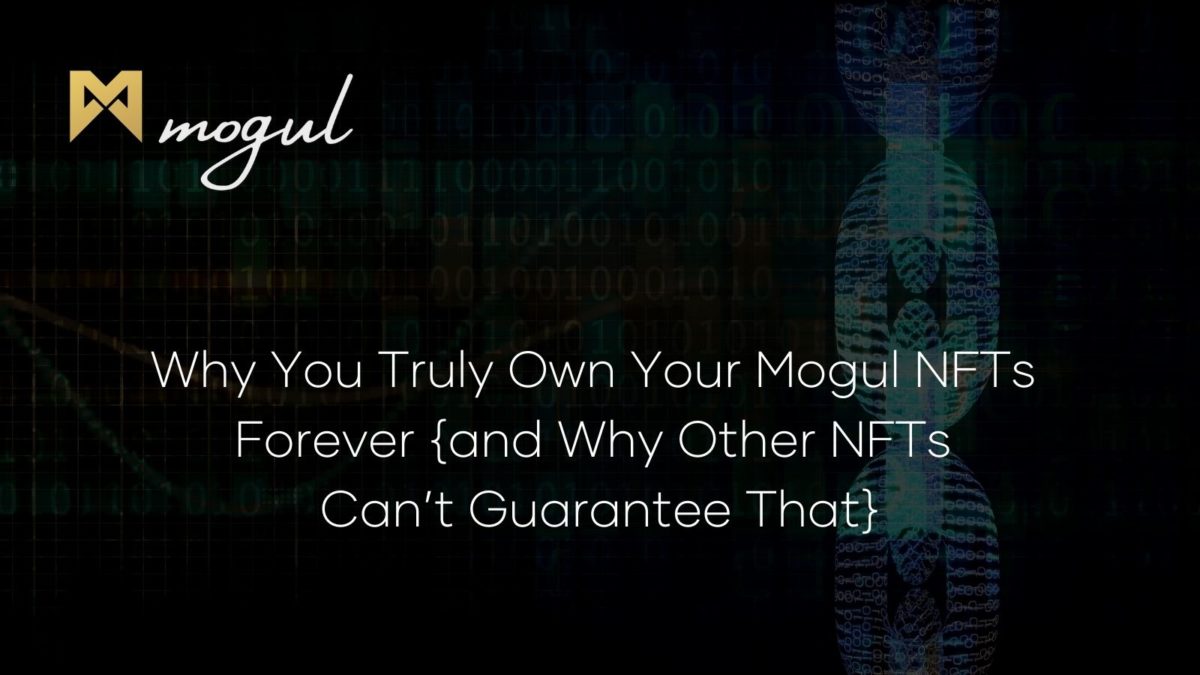
Hint: The reason is IPFS
NFTs have been all the rage in cryptocurrency for at least six months now, and there are many reasons why people love NFTs.
Most crypto users and members of the Mogul community know NFTs as valuable digital collectibles you can buy and sell on marketplaces like OpenSea or Rarible. But in a broader sense, NFTs simply represent proof of ownership.
Think about it.
Mogul Access Passes are also NFTs. You can buy and sell them but Access Passes are not collectibles themselves. An Access Pass is not a piece of artwork per se (though it is beautiful!).
Here’s the thing. When people hear about NFTs and proof of ownership in the same sentence, they assume that as long as they own an NFT, they get to keep it forever. That is the fundamental value of what an NFT is supposed to provide. Proof of ownership for as long as you hold onto the NFT.
That said, have you ever asked yourself what happens if an NFT gets taken off of the server hosting it?
How will you access your NFT if it’s hosted on a centralized server like Amazon Web Services (AWS) and the person or company responsible for the AWS account holding your NFT stops paying the bills?
A blockchain file transfer protocol called IPFS is the answer.
It’s what Mogul NFTs are built on, and it’s what guarantees you will own yours for as long as you want to.
Why Most NFT Projects Can’t Guarantee You Ownership in Perpetuity
Amazon is no doubt a huge company. AWS is one of the most trusted cloud-based file storage services in the world. In fact, incoming Amazon CEO Andy Jassy made his name within the company because he helped found, develop, and grow AWS into a revenue-generating machine for Amazon.
Many of the digital assets you and I take for granted when we search for them online are stored on AWS or competing cloud services owned by Google, Microsoft, etc…
However, as much as we take those cloud services for granted, the files stored on individual user accounts can disappear if individuals and businesses stop subscribing to the service.
This means that if you buy an NFT stored on a cloud somewhere, and the people paying the bills to host your NFT on that cloud stop paying, your NFT is gone for good. It doesn’t matter that you have proof of ownership, and it doesn’t matter if you paid $1 million for that NFT.
The whole reason IPFS exists is to decentralize file storage so that nobody can make your intellectual property disappear.
Traditional File Servers vs. IPFS
Let’s briefly break down the difference between a centralized server and IPFS.
How Traditional Financial Servers Work
In order to understand how IPFS works, you need to understand how users access files on the Internet today, and how IPFS functions differently from that.
Let’s say that you’re looking to download an image off of the Internet. Your computer finds that image using a combination of your IP address or the URL you type into your address bar. Using technology to search for an image in this fashion is referred to as location-based addressing.
Location-based addressing makes it easy for you to pull up an image as long as a centralized server is powered on and working properly. Using a centralized server offers two advantages. First, it means you can have an administrator take care of that server. Second, it means that you can get access to the content you want quickly.
One of the disadvantages of traditional servers is if the server goes down you can’t access the image. Another is if the company chooses to change the NFT image, then can at any time without any notice. No questions asked!
What is IPFS?
IPFS stands for InterPlanetary File System. It’s basically a fancy name for a decentralized file system that exists on the blockchain. If you’re an experienced crypto user and are aware of other big projects outside of Mogul, you might have already witnessed IPFS in action.
How IPFS Works
IPFS is a decentralized, peer-to-peer file storage and sharing protocol. Instead of relying on location-based addresses to point to digital assets, it uses content-based addresses.
IPFS assigns strings of characters called hashes to individual files stored on the protocol. Instead of specifying the location of the file you want, you specify the exact content you want using the appropriate hash.
If there are multiple copies of a given file, each will have its own hash, so that users who are supposed to have access to that file can still have their own copy, but the blockchain itself can maintain efficiency using those unique hashes.
When a crypto project needs to store immutable data, it is stored as an individual object that can be no larger than 256 kB. That doesn’t mean you can’t store larger files on IPFS protocols. It just means that multiple objects need to be attached together in order to exchange larger files.
The Advantage of Using IPFS Over Traditional Cloud Storage
The main advantage of using IPFS over cloud storage is that blockchains are immutable. The data on them can’t be manipulated, changed, or counterfeited. Once a file is uploaded and assigned a hash, it stays there, just the way a Bitcoin transaction registers permanently on a public ledger.
Mogul NFTs are stored using IPFS. This means that your Mogul NFT is yours forever (or until you’re ready to part ways with it). No need to worry about a major hack stealing a unique and valuable collectible from you. No need to worry about your Access Passes disappearing from your public profile all of a sudden either.
You’ve probably never thought of the idea of losing NFTs before because it’s not something that often gets highlighted in the marketing of projects or collectibles that sometimes sell for millions of dollars.
Now that you know it’s possible to lose an NFT because of human error or somebody not paying the bills, you understand the true value of a Mogul NFT that lives on IPFS.
Like a star on the Hollywood Walk of Fame, Mogul NFTs are meant to be set in stone. Or in this case, set on the blockchain. No matter what Amazon, Google, or any other centralized cloud storage service has to say about it.

Loyalty reward programs have become a necessary and integral part of the shopping experience. From the arm’s length of coupons at CVS to the grocery-store gas discount that takes 5 cents off a gallon, reward loyalty programs are everywhere. That isn’t new news. However, despite the reward industry’s tremendous impact on shopping, there are still improvements that can be made. Chiefly among them are security, transferability, expiration, and ownership.
Mogul’s STARS Rewards are uniquely positioned and designed to improve upon these industry pain points. STARS grants film fans with total ownership and control over their rewards as well as all the freedom of transferability.
The Success of Rewards Programs Over Time
Even long before the scannable keyring card, or the REI Co-Op dividend check, there were the campaigns to cut out cereal box tops to get collectable PEZ dispensers. Even the McDonalds Happy Meal which was first rolled out in the 1970s featured a circus-themed toy.
Customers will go out of their way to earn rewards they deem worthy. A KPMG survey found that two-thirds of customers said they made a special trip to shop at a store just to earn a reward from a loyalty program. That same survey found that 60% of respondents admitted that they would shop at a store even if it had slightly higher prices just to earn a reward.
Customer Loyalty in the Film Industry
Customer loyalty has also proven successful in the film industry. One of the most successful campaigns to come out of Canada in the last decade has been Scene Points. They have been able to sign partnerships with Universal and boast more than 10 million members across Canada. The platform enables members to earn and redeem points for movies, downloads, rentals, and concessions. Members also earn points at restaurants across Canada.
However, despite the tremendous success of the organization, the company was founded in 2007, and the program has not evolved much since then. We live in an age where technology accelerates rapidly so early innovators are limited in seeing the future potential of their technology.
Even one of the Wright brothers who invented the airplane said that “No airship will ever fly from New York to Paris. That seems to me to be impossible.”
Drawbacks of the Current Film Loyalty Landscape
With that said, despite its success, Scene Points has several drawbacks that would benefit from blockchain technology. Some of the main drawbacks are:
- Point Expiration
- Loyalty Program Fraud
- Lack of Ownership and Transferability
Problem 1: Points Expire
One of the most commonly cited complaints from customers of rewards programs is that the points expire. According to Clarus Commerce, 56% of shoppers say they changed or abandoned a purchase when they realized their points had expired. The customer needs to feel valued, and that means their rewards should feel valuable, both now and in the future. A perfect example of this approach’s effectiveness is the strategy used by Amazon Prime. With Prime, there are no points that expire, and members get rewards with every single purchase. That is part of why Prime members spend more than double what non-Prime members spend every year.
Problem 2: Loyalty Program Fraud
Another major problem facing loyalty programs is rampant fraud. According to Strategic Finance, estimates have found that fraud has affected over 70% of loyalty programs. Just last year, Scene card holders lost thousands of points due to fraudulent activity. Many loyal customers lost their valuable rewards because they had been redeemed fraudulently. When Cineplex finally caught on to this activity, they responded by freezing customers out of their accounts. This only further aggravated the already frustrated Scene cardholders, many who took to social media.


Problem 3: Lack of Ownership & Transferability
At the end of the day, Scene Points belong to the company, not the customer. If Cineplex wants to take away the points, they can. They also dictate how the points can be spent. They do not allow points to be transferred between reward members. The limitations of this system lessen customer experience and impede its growth. Having the freedom to use their points how they want would drive customers to accumulate more points and boost the overall ecosystem.
Benefits Blockchain Could Provide to This Program
- No Point Expiration
- Fraud Prevention
- Full Ownership & Transferability
No Point Expiration
Blockchain provides the ultimate solution to this problem. By providing irrevocable tokens as reward points, customers can feel confident in the long-term value and redeem-ability of their points. Their points never expire and as a result the long-term retention rate of loyal customers will increase. Their rewards points will remain forever on the blockchain, and customers will remain forever a part of the rewards program.
Fraud Prevention
One of the biggest advantages that blockchain technology provides is unparalleled security. By using cryptographic encryption, blockchain secures the rewards platform against hackers. This reduces the risk of fraud and assures companies that their rewards program cannot be exploited. More importantly, this promotes customer faith in the system and increases the likelihood that they will enroll and participate.
A 2019 Harris Poll conducted in the U.S found that 71% of participants are less likely to enroll in a loyalty program that collects their personal information. This is mainly due to the customer’s concern about the security of personal data. In the aftermath of big data breaches, security has become one of the main concerns for consumers. A 2018 study by ExpressVPN discovered that 90% of people worry about data security, citing theft and fraud as the main reasons. Blockchain offers the solution to this problem, potentially enticing a huge customer base that previously wouldn’t participate due to security concerns.
Full Ownership & Transferability
One of the unique aspects that blockchain technology permits is a revolutionary ability for complete ownership and transferability of rewards points. One of the main drawbacks of current rewards programs is that the customer points belong to the company, not the customer. This means that a company can take points away from customers for any reason, and this creates a lack of faith in rewards points from customers. In addition, most rewards programs prevent members from transferring points between one another, and this can dissuade customers from accumulating as many points as possible.
Blockchain dynamically addresses this problem by handing over point ownership to the customer. Companies can no longer take points away from customers on a whim, and as a result, customers can feel secure about their points always being there. Also, blockchain allows complete transferability of points between members. Now members can give their hard-earned points as gifts to their friends, promoting enrollment from new members eager to redeem these gifted points and increasing loyalty potential with new members.
Introducing: STARS rewards
Mogul offers totally unique rewards that are special to the film industry. Those rewards include things like executive producer credit, thank you credits, and dinner with a director. These A-List rewards are only one part of the Mogul Rewards system. Other tiers include one-of-a-kind movie posters, rare NFTs, and set-used memorabilia.
Mogul’s blockchain-based reward model incentives platform usage through the STARS token. Throughout Mogul’s community-building process, fans are rewarded for their involvement in greenlighting and supporting films from script to screen. The STARS token powers the Mogul Community, and gives fans and screenwriters total access to Hollywood. STARS tokens are redeemable for bespoke rewards most movie fans would never have access to.
In Conclusion
Rewards programs are a time-tested way to increase customer engagement and retention. However, many of the challenges pervasive in the current system stifles the true capability of these programs for both the company and the consumer. Both existing customers as well as a huge number of potential customers are eager for a viable solution. Blockchain solves these problems, and Mogul’s blockchain-based rewards platform is a revolution in the rewards industry.
By using the STARS token Film fans get access to one-of-a-kind rewards that never expire. These rewards are secure and completely owned by the customer. The STARS token unlocks an entirely new level of customer engagement and satisfaction never before possible without Blockchain.
Established in 2019, Mogul Productions is a blockchain-based film finance and production company with a presence in Canada, the United States of America, and Europe. Mogul’s platform connects contributors, film industry professionals, and fans through technology that allows all users to engage and participate with each project throughout its entire life cycle.
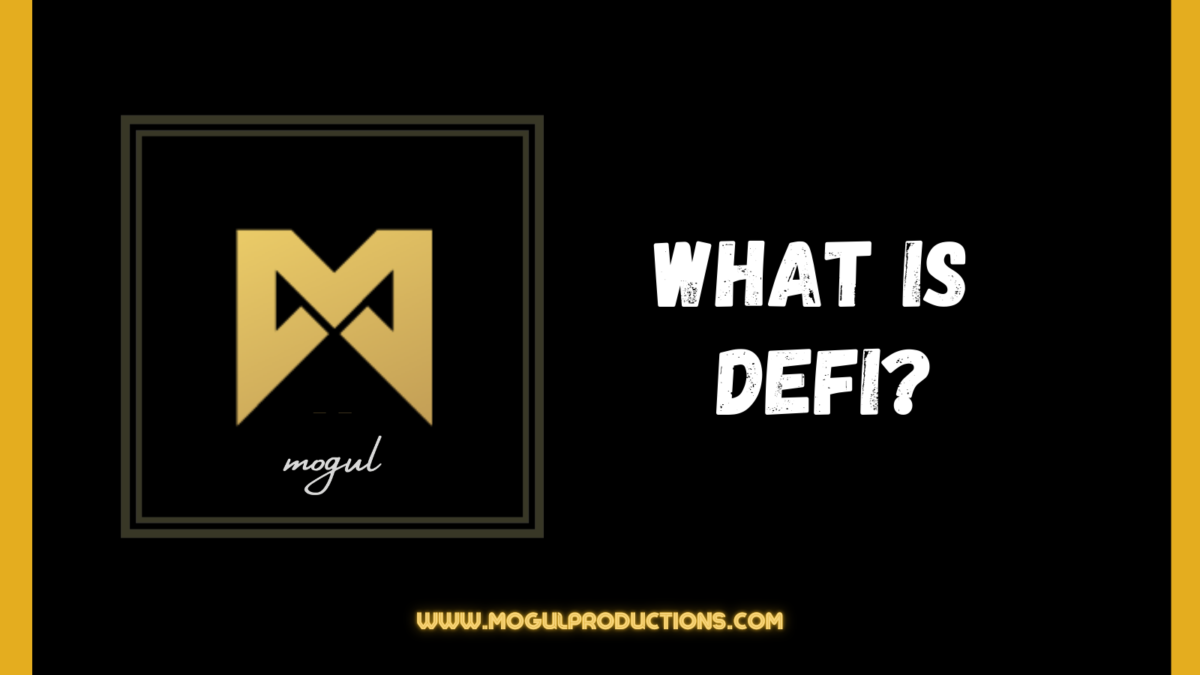
Today, the world’s centralized banks are printing money at unprecedented rates to plug the holes of a sinking global economy. Unlike before when national currencies were still pegged to the gold standard, most of the currency being printed today isn’t backed by anything at all. Decentralized solutions for alternative and more direct payments are emerging to bypass these antiquated, centralized systems.
Hence, decentralized finance (DeFi) has been one of the fastest-growing sub-industries of blockchain. In 2020 alone, DeFi’s Total Value Locked (TVL) grew from $660 million in January to over $11 billion in November; an increase of over 400%. Mind-blowing! DeFi technology is used across software applications, lending services, and now with Mogul… film.
DeFi in the Film Industry
Mogul allows filmmakers to go beyond centralized, massive production houses. Using our STARS token and continuous fund, filmmakers and movie fans alike have a decentralized voting and financing framework where standout films are chosen for the big screen.
To learn more about cryptocurrency and its applications, head over to our website.
Major DeFi Opportunities: dApps, Lending, And NOW… Film
Within the field of DeFi, there have traditionally been two major use cases: dApps and lending. Lending has more to do with what we just previously touched on with TVL, whereas dApps are sort of the smarter, younger cousin of banking applications that users are already familiar with. However, there are still new use cases emerging, like what we’re doing with DeFi and film.

dApps
One major difference between a smartphone app that you have downloaded on your device right now and a dApp is that dApps rely on peer-to-peer servers to run the backend code. Traditional smartphone apps use standalone computers, or single cloud servers to run their code. Popular examples of dApps include CryptoKitties, UniSwap, and OpenSea. Of course, CryptoKitties is an example of a non-fungible token as well.
There are also some outside-the-box ideas for dApps. One example is Augur, which describes itself as the world’s most accessible, no-limit betting platform. Another example of a unique dApp is PoolTogether, a decentralized, no-loss lottery application that allows all participants to get money back with one participant winning all the interest from a shared pool.
Lending
Loans are one of the fastest-growing markets within the DeFi space. Similar to what banks have been able to do for centuries, crypto holders can earn interest on their digital assets by loaning them out. Borrowers then have to put collateral down to secure the loan, just like a person or company would have to do in the physical world.
Film
Our development team has created a quadratic voting module within our platform that allows STARS holders to earn up to 0.5% yield per day on their balance for casting and staking their votes. Our protocol incentivizes users to voice their opinion. This type of voting reflects decisions that are representative of the entire community, not just whomever has the most tokens.
Ethereum co-founder Vitalik Buterin has recently commented both on the potential for blockchain-based voting, and on quadratic voting (QV) specifically.
He said “The technical challenges with making a secure cryptographic voting system are significant (and often underestimated), but IMO this is directionally 100% correct.” Read Vitalik’s paper on QV here.
Mogul uses the Ethereum blockchain and we understand the potential of the technology’s impact on voting.
Visit our website to learn more about how Mogul is using DeFi for film.
In Closing
Decentralized finance and technology will continue to grow as the world continues to crave alternative solutions to centralized financial structures. DeFi products will revolutionize the way that the average person borrows, saves, and spends money. However, far beyond applications like lending, the possibilities for DeFi to extend to more than money are endless. It will be exciting to see how the next year of development will advance the industry.
At Mogul, we’re exploring applications for DeFi and the film industry. Stay ahead of the curve on decentralized finance and other crypto topics by visiting our website.
FAQ
What is DeFi in crypto?
Decentralized finance (DeFi) has less to do with cryptocurrency than it does the financial technology that runs in the background of crypto. DeFi is a guiding philosophy and design principle behind alternative asset classes and related technology. It is a move away from massive, centralized production houses that can bring power to the crowd.
Mogul Productions, established 2019, is a blockchain-based film finance and production company with a presence in Canada, the United States of America and Europe. Mogul’s platform connects contributors, film industry professionals, and fans through technology that allows all users to engage and participate with each project throughout their entire lifecycle, from financing through to production and distribution.
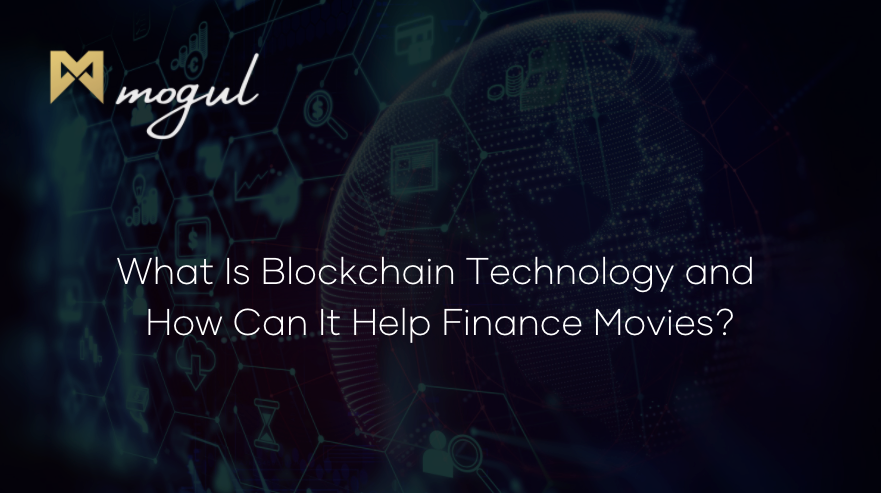
The overwhelming majority of blockbuster Hollywood movies that you watch are created and financed by a very exclusive group of stakeholders with a lot of power and money, and little motivation to change the way things work.
This might be good for the powers that be, but it’s not so good for the creatives, producers, financiers, and fans that aren’t part of this exclusive group.
Blockchain technology can change that. It can democratize the film production value chain in a way that’s more equitable for all stakeholders involved.
Let’s dive deeper into what a blockchain is and why we at Mogul are using it to change the future of film.
What Is Blockchain Technology?
When you think of a database, what images come to mind? Perhaps you think about spreadsheets, or maybe a server that stores sensitive information related to business, banking, customer data, or other vital pieces of information that you might use either for work or personal reasons.
Ask yourself, what do each of these vital pieces of information have in common? They all typically live on centralized servers that computers need to access in order for you to make use of the data.
The problem with hosting on centralized servers is that centralized servers can be hacked.
A blockchain is a decentralized server. It is essentially a community of users lending their computing power to a network that doesn’t have a focal point of attack. Data can be stored in a secure and trustless environment in such a fashion that a hacker can’t get to it because there is no central server storing all of the information in one place.
Another Reason a Blockchain Is More Difficult to Compromise
Imagine a strand of DNA. You know, the classic image of a helix you learned about in high school biology class?
A blockchain organizes data into groups or blocks, and these blocks are tied together. The only way to reveal the data hidden within each individual block is to unlock every other block in the chain.
While it is technically possible to do this, once you have thousands or millions of blocks of data in reality it’s nearly impossible to steal that information.
What Can Blockchains Be Used for?
Mogul uses the blockchain to allow users to vote on movies they think should go into production and be financed by the Mogul community. We also use the blockchain to distribute STARS tokens to users and provide proof of ownership to the NFTs we create.
That includes not just the NFTs that represent Mogul Access Passes, but also the unique works of art and intellectual property created by Mogul-funded films and events, like the artwork created by Marvel and DC Comics artist Rob Prior.
The reality is that blockchain technology itself is just a decentralized database where information is stored, secured, and validated by users. The information itself can be related to anything you can think of. In the case of Bitcoin, the data stored on the blockchain is related to currency or exchanges of value.
In the case of Ethereum, data can be related to currency, NFTs, and decentralized applications. IBM uses blockchain technology to store data related to supply chain management and logistics. Governments can use the blockchain to store information related to healthcare or passports, or other sensitive details that could normally be stolen from a centralized server.
But our own personal favorite use case for blockchain technology is decentralizing the financing of movies.
Here’s How Blockchain Technology Can Help Finance Movies
If you’re a movie buff (if you’re reading this, you probably are), you’ve probably not only watched your share of movies, you also know that a hit movie can both spend and make a lot of money.
The Hollywood movie industry is not just about the glitz and the glamour of the red carpet or which actors and actresses are dating each other. It’s big business and it’s big money.
What you might not know is that most of this big money is controlled by 5 major film studios in Hollywood:
1. Universal Pictures
2. Paramount Pictures
3. Warner Bros. Pictures
4. Walt Disney Pictures
5. Columbia Pictures
What does it mean when very few players have control of most of what happens in a given industry? It means it’s very difficult to get a movie made if you’re not in the know with one of these five companies.
Mogul uses the blockchain to connect creators, movie fans, film financiers, and other contributors to projects that may not get funded by the above film studios, but can still have tremendous value both at the box office (including its digital and streaming equivalent) and in terms of the artistry, storytelling, and excitement that they help bring to life.
Many movies that wouldn’t otherwise get made might get pulled off of The Black List, for example, by a select few industry insiders and become Oscar winners.
The Mogul community allows users to participate in the making, financing, and potential of such movies without the backing of a major studio. Mogul becomes a de facto digital studio, driven by the fans, using blockchain.
How to Get Involved with Blockchain Technology and Mogul
Taking a sneak peek inside the Mogul community is as easy as registering for a free account.
Once you do that, you’ll have access to a dashboard, a showcase of the latest films being voted on for financing and production, a community portal where you can stay up-to-date on upcoming Mogul events, and a farming platform that allows you to benefit from the STARS and Ethereum tokens that you contribute to growth farming pools.
Using all of the above tools, you can benefit from the next great movies being produced with input from our community and share in their success the way the five major film studios and industry insiders have been doing for decades.
Get familiar with blockchain technology and understand how it has the power to decentralize both data and finance.
It’s time to help the next Oscar winner come to fruition and Mogul is the gateway to make that happen!

We’re excited to announce that STARS tokens are officially usable on Binance Smart Chain (BSC). The launch means that movie fans, financiers and creators are going to be able to use STARS tokens on ApeSwap, the fastest-growing decentralized exchange living within the BSC ecosystem.
What is ApeSwap and what does the integration entail?
The answers to those questions are hopefully going to get you excited, so let’s focus on doing just that!
What is ApeSwap?
ApeSwap is an automated market maker and decentralized exchange living on BSC. The platform itself allows users to swap, hold, farm, and purchase cryptocurrencies on the BSC network.
ApeSwap’s smart contracts are a fork of Pancake Swap and have been fully audited for the safety of their users, and the platform has been experiencing immense growth in their community of extremely engaged followers.
One of the key differences with ApeSwap is that it offers its own native currencies called BANANA and GNANA. BANANA is what users provide to the platform in order to earn more value through yield farming. This means staking tokens and providing them to liquidity pools so that other users can make trades in a decentralized format and the platform itself can pay for development.
It’s a win-win for everyone involved. And now, because STARS tokens are going to be available on the platform, it means the Mogul community wins too!
Why Integration on ApeSwap Is a Win for Mogul and the STARS Users
Crypto enthusiasts using BSC to acquire the tokens of their choice are ultimately looking for two key things. First, they want to save on smart contract fees. Secondly, they want to be able to complete transactions faster than they could on the Ethereum blockchain for example.
ApeSwap offers these two key benefits by offering a Uniswap-like interface on the Binance chain.
Add that to the fact that ApeSwap offers not only yield farming and liquidity pools, but also the ability to launch Initial Ape Offerings and Non-fungible Apes on the platform, and it’s easy to see why more and more users are heading towards ApeSwap.
In light of the fact that ApeSwap is becoming more and more popular, and more and more developers and crypto enthusiasts are now aware of the advantages of using BSC over other blockchains, it makes sense to move an exciting project like Mogul and our accompanying STARS token to the platform.
It’s time to bring all of the benefits and advantages of an automated market maker living on a decentralized platform to the ultimate DeFiFi project.
It’s a match made in movie heaven!
How to Move Your STARS Tokens from Ethereum to BSC and ApeSwap
The process of switching over an Ethereum compliant STARS token so that it is compliant with BSC is called bridging. You have to do this in order to benefit from the lower fees and faster transaction speeds that BSC and ApeSwap offer.
The result of bridging your tokens from one platform to the other is that your STARS tokens move from being ERC-20 compliant on Ethereum DEXs like UniSwap to being BEP-20 compliant and thus, compatible with Binance related platforms like ApeSwap.
Read this guide found in our knowledge base and follow the easy steps that will allow you to bridge your STARS from Ethereum to BSC.
What a month for Mogul!
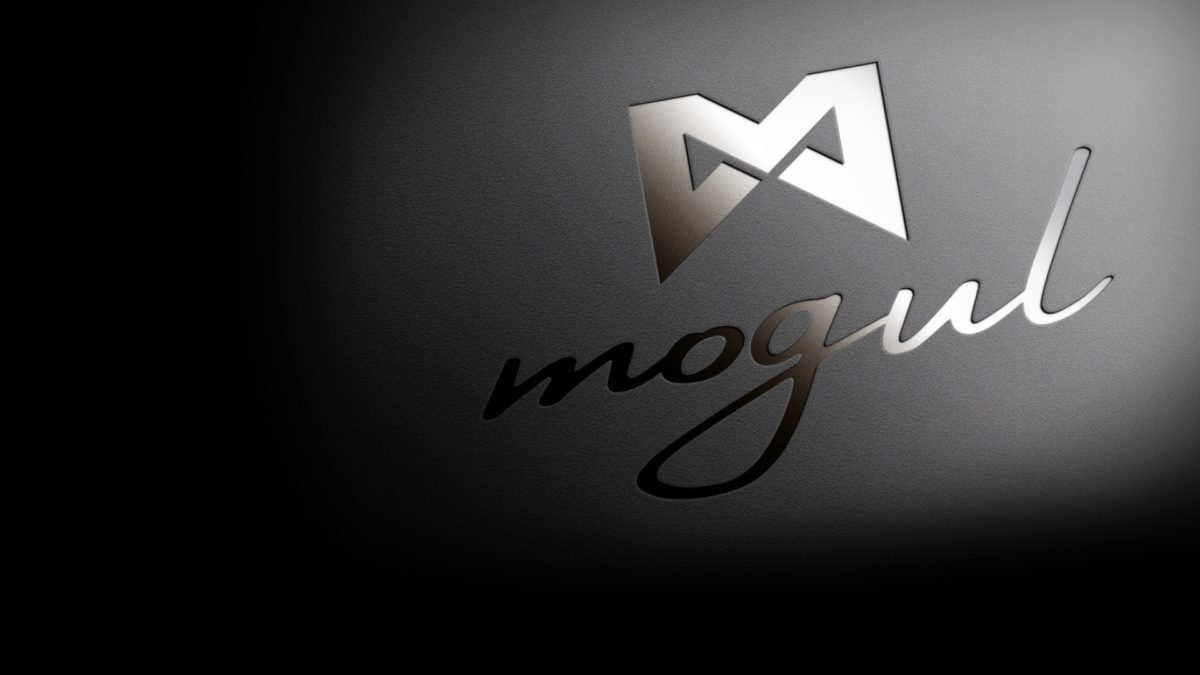
From amazing guests on Mogul Live, lots of action in the press, to one of our advisors winning an Emmy award — this month had it all!
Mogul Live Season 1 ended as a smashing success and we had interviews with a top Hollywood actor, concept artist, TV studio, manager and PR agent! Such an amazing first season.
But….. great news! We announced Mogul Live Season 2 guests. Tune in this month to listen to top producers and casting agents in the industry, including:
- Justin L. Levine — Toronto-based Producer with Stardust Pictures and partner in Cast Caller (watch Justin’s interview here)
- Kathryn Courtney Prior — Founder of Singapore-based company Yaplat Casting
- David Cormican — Toronto-based Emmy®-nominated Producer and Co-Founder & President of DCTV
- Josh Gloer — LA-based Writer & Producer with G10 Creative
- Cindy Cowan — Hollywood Producer (won an Emmy last month for producing Miracle on 42nd Street, featuring Alicia Keys and Samuel L. Jackson!)
If you missed Season 1, head to our website or YouTube channel to watch all of the episodes.
Remember to follow us on Instagram to tune into this month’s season of Mogul Live!
Mogul Official Statement
In light of recent events in Minnesota, please read Mogul’s official statement:
“Mogul stands with the black community and people of color, and recognizes that until they can truly live without fear, silence is simply not an option.
We must hold ourselves accountable and interrupt the cycle of systemic racism that exists in our world through our daily actions and in the words we choose. We must seek to understand and strive for justice and respect, and to make each day less racist than the one before.
Mogul continues to remain committed to create more transparency, inclusion and diversity in storytelling!”
Next month we will be featuring Mogul team member, Lyriq Bent, as a special guest on Mogul Live. Lyriq will speaking about his career and experience, and what he feels is missing in the industry. This will be an incredibly timely event for our community and we’re ecstatic to have Lyriq speak about his experiences as a Canadian BIPOC creator.
Mogul in the Press!
Check out these articles that featured Mogul this month:
Plus more!
Monthly Mogul
If you know of another member of the Mogul community who is accomplishing great things in the industry and deserves to be recognized by their peers, let us know! We’re always looking to celebrate and highlight the successes of outstanding Moguls!

This month’s Monthly Mogul is Cindy Cowan! Cindy is an advisor for Mogul and part of the Mogul community. Cindy had two big celebrations in May — her birthday, PLUS an Emmy Award for her role in producing Miracle on 42nd Street. Congrats Cindy!
Community Spotlight
Take a look at what members of the Mogul community have been up to:
Piers Tempest, Mogul advisor and producer of Love Wedding Repeat, has seen great reviews from the British rom com which recently launched on Netflix globally.
Dane Hallett’s work has been on display in a huge way. Extraction was one of the top films on Netflix last month. Dane was the concept artist for the film.
Congratulations to Mogul advisor David Cormican who is now guest lecturing at OCAD University on Advanced Cinematic Production.
And finally this month, a big shout out to community member Sarah Louise Collidge who signed with Play Management, a top Canadian talent agency and management company. Give her a follow on Instagram!
Shoot us a message if there are others in our community who have been Moguls this past month for a shoutout!
Industry Reads
Top, curated industry reads directly from our team:
- The dark side of the film industry and making sure film workers get PAID
2. Mogul Interview with Jessica Ross
3. Using the Power of the Crowd in film
4. How Tik Tok is exploding in Hollywood
5. How Hollywood is coping with COVID-19
ABOUT MOGUL PRODUCTIONS (MOGUL)
Mogul Productions, established 2019, is a blockchain-based film financier and production company with a presence in Canada, the United States of America and Europe.
The Mogul platform connects contributors, film industry professionals and fans through technology that allows all users to engage and participate with each project throughout theirs entire lifecycle, from financing through to production and distribution.
Weekly STARS Stats Roundup
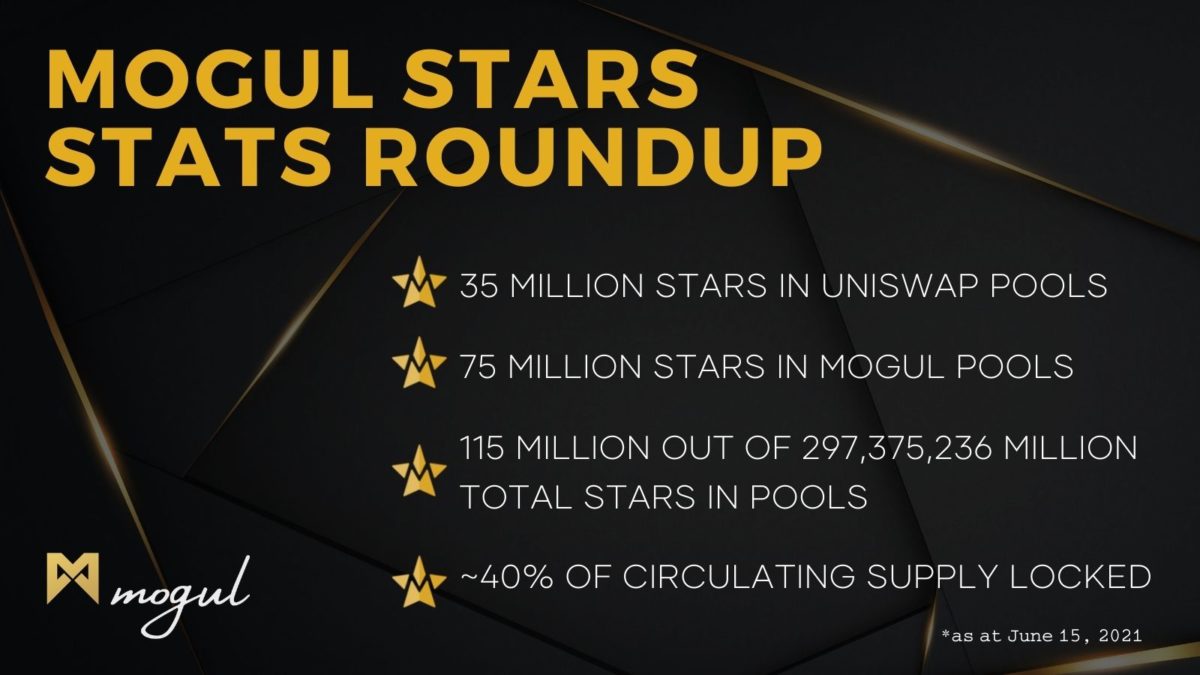
As you may know, there are many benefits to being a STARS token holder on the Mogul platform.
The STARS Stats Round-up gives you the most recent breakdown of exactly what’s happening inside of Mogul growth farming pools.
You can vote on movies you would like to see get made, send and receive STARS between other users, acquire Access Passes, buy rare NFTs to add to your own personal digital movie memorabilia collection and benefit from all kinds of interesting promotions, contests, and giveaways that could get you an Executive Producer credit for a movie and all kinds of once-in-a-lifetime behind the scenes experiences.
This first round-up features some very impressive totals. No fewer than 115 million STARS tokens out of 297,375,326 are currently locked in our growth farming program.
That includes more than 35 million STARS tokens being pooled for our growth farming program on Uniswap and an additional 75 million tokens locked up through Mogul’s own Master Chef contract.
That means a whopping 38.6% of all STARS tokens are helping grow the Mogul community!!
Learn more about growth farming and support feature films that deserve to get made.
Utilizing the Power of the Crowd

The “Power of the Crowd” is one of the main pillars for Mogul’s business model. The idea is that the traditional film funding model, which is based primarily on what company shareholders think are movies people want to see, is antiquated and that a new film model needs to take into account what type of movies film fans want to see. It might be more apt to describe this as the “powers” of the crowd as there are many benefits to bringing fans into the filmmaking process. The one being discussed here is the crowd’s ability to revive dormant franchises and IPs with financial potential. The most successful crowdfunded film project on Kickstarter is “Veronica Mars.”
Veronica Mars is a continuation of the 2004–2007 TV show of the same name. The TV show had garnered a big cult following but was not performing well in CW and UPN ratings and thus was canceled after only 3 seasons. The series’ creator Rob Thomas pitched a continuation film to Warner Bros in 2007 that the latter declined to fund, feeling a lack of money-making potential. Thomas’ script would go untouched until 2013. That year, he decided to create a Kickstarter to fund his feature film. The campaign would raise 2 million USD within the first 11 hours and would end its campaign with 5.7 million dollars. This makes Veronica Mars the most successful crowdfunded film project on the platform by money earned. Warner Bros. subsequently decided to release the film to a limited theatrical run and VOD platforms on March 14, 2014. The film grossed 3.5 million at the box office. While that may initially seem like a failure, the truth is far from it. Since it is a continuation of an existing cult TV show, the theatrical release was very small. Clearly, the movie recouped its budget in the VOD market because after 2 novels and a web-spinoff, Hulu announced a series revival in 2018 that was released on July 19th, 2019.
Hollywood film studios these days are very conservative when it comes to what franchises they decide to fund. As big budget filmmaking gets more and more expensive, studios can only afford to really focus on 1 or 2 massive tentpole franchises where they can expect to get a big return on investment. The big 5 majors would rather spend $250 million dollars on one massive film they know will gross 1 billion dollars at the global box office in 1 theatrical run rather than spend that money over twenty $5 million dollar films, ten $25 million dollar films or five $50 million dollar films. What this means is that the mid-range budget franchise or mid range original IP is becoming more and more of a rarity in yearly Hollywood studio release slates. The current system is high risk-high reward. If a movie does well, the studio thrives (Avengers MCU, Avatar, Jumanji). However, the problem of tentpoles is that if a movie does poorly (eg. Heaven’s Gate, Solo: A Star Wars Story, John Carter), future film releases get cancelled and studios can go bankrupt. It is in this spirit that harnessing the power of the crowd for mid-budget franchises allows studios to see the financial incentive to diversify their portfolio. It is not even necessary to create new IPs (if one is particularly concerned with keeping costs down) but merely revive cult classics to find the next “Veronica Mars.”
Join Mogul. Be a Mogul.